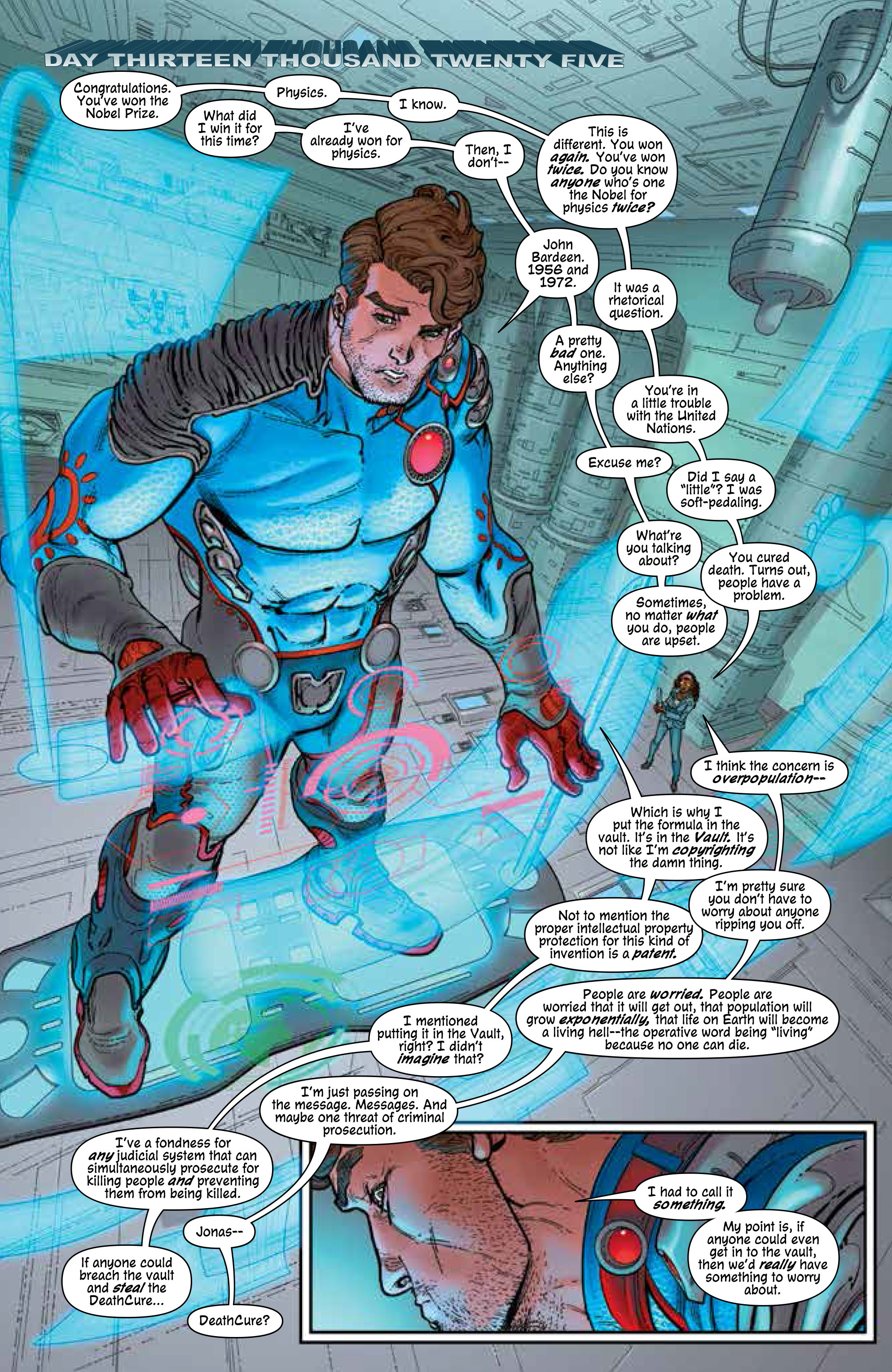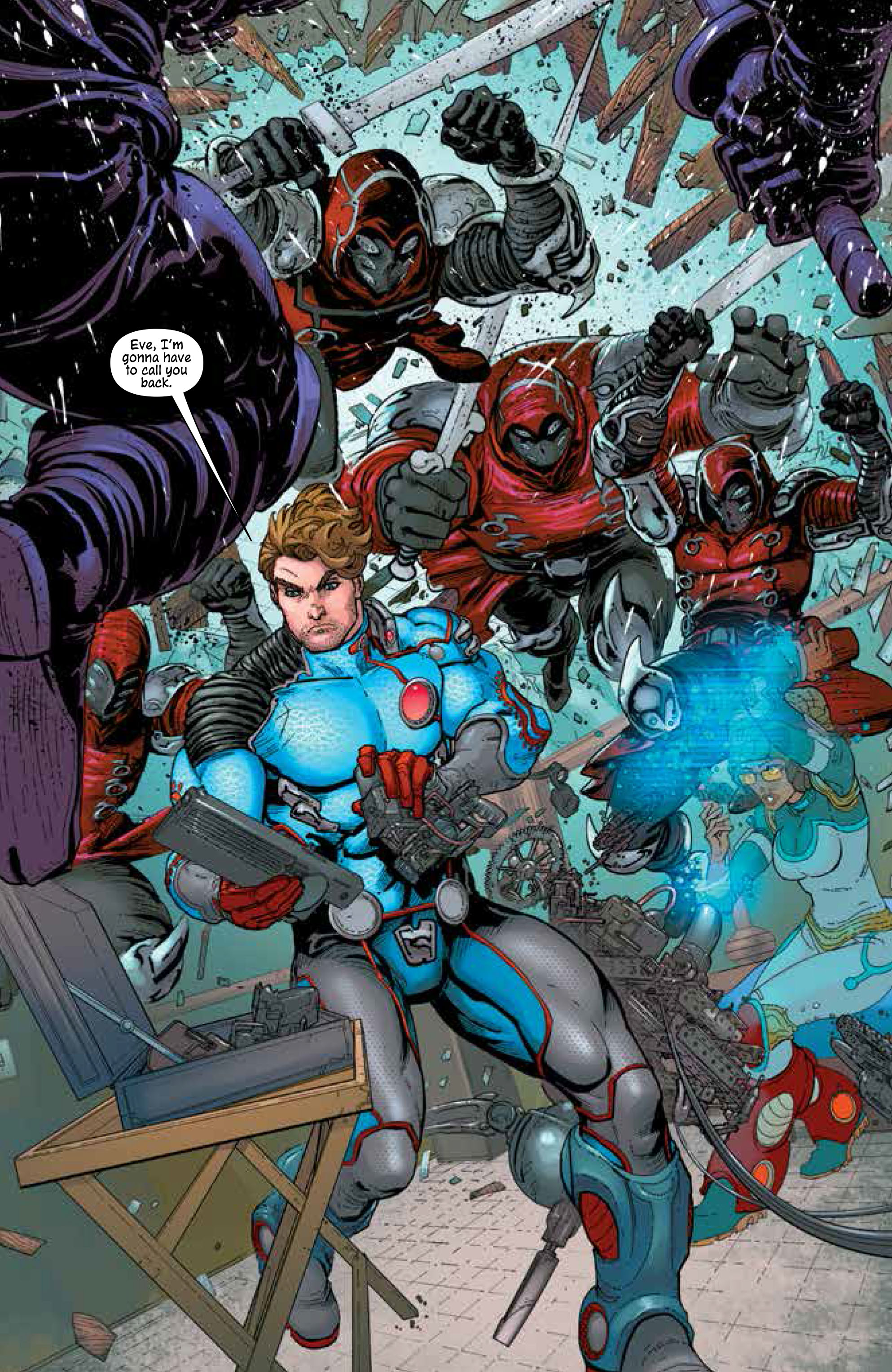I recently had the chance to speak with Marc Guggenheim about his new book “The Infinite Adventures of Jonas Quantum.” Guggenheim is perhaps most well-known for his work adapting and writing The CW’s “Arrow.”
Guggenheim is no rookie in the realm of writing and creating comic books, he has worked for both of the major publishers contributing work to some of the most beloved tights and capes characters including Aquaman, Wolverine, The Punisher, and Spider-Man, among others.
What makes this new project exciting is that it breaks away from establish characters and allows Guggenheim to add a new player to the super hero pantheon. The titular character is described as a maverick hyper-genius with the power to cure death in the morning, time travel in the afternoon, and unlock trans-dimensional wormholes at night.
The first issue of “The Infinite Adventures of Jonas Quantum” is in stores now; the series will span six issues and promises to be exciting and entertaining. Let’s see what else Marc has to say about it.
BSR: This character is a little different than what you typically see. How did you get the idea for this character and the universe?
MG: Thanks, I’m going to take that as a compliment. A little while ago, like fifteen years ago, I was playing around with ideas and I was thinking about how there hadn’t been too many new characters created that really stuck in the public consciousness. It felt like everything was a reboot, and this was fifteen years ago it’s only gotten worse now, everything is a reboot or a sequel or a remake or something. I was thinking about what was the last new character and I started thinking about Indiana Jones and how much of a revelation that character was when he came on the screen, and I started thinking about how that character was George Lucas’ and Steven Spielberg’s reaction or homage to James Bond. I started thinking of Indiana Jones as an iteration or evolution of James Bond. Well what’s the evolution beyond Indiana Jones? One of the things that I always sort of liked about Indiana Jones and is an important part of his character is his intellect. So I started noodling with the notion of a guy whose super power was his intelligence and that’s really where the idea came from.
BSR: You’ve worked on longer running TV shows, things that run seasons over seasons, and this is a six issue more contained story. I wonder how this is different for you creatively from working on TV.
MG: It’s funny this project is, by design, very different from both my TV work and my comic book work in the sense that I’m really doing a series of self contained adventures. Each issue has a beginning, middle, and end and they don’t necessarily unfold linearly in the sense that issue three doesn’t necessarily come after issue two. I’ve given myself permission to jump around this guy’s life and just tell these stories about his adventures. The conceit of the book is these self contained adventures that are non-sequential and that’s not something that you see in television. It’s something that you can almost only do in comics; it’s sort of its own animal I guess.
I think I’m old enough to remember the joys of a self contained issue and the uniqueness of that kind of art form. I love longer form comic book story telling but I’m also a sucker for the quote unquote done-in-ones and that’s one of the fun elements. Because Quantum was designed to be sort of this love letter to the early days of comic books, it felt appropriate to adopt the tradition of those early days and those stories were done in a single issue.
BSR: It seems kind of like the perfect comic book to introduce a new reader to. They could jump into any issue and have a good time but it’s also small enough that it would be easy to collect.
MG: Yeah, I think so. It definitely is very new reader friendly. My hope is always that with my comic book work I always hope to bring in some of the “Arrow” audience, people who watch the show but don’t read comic books. I always fantasize that maybe I’ll do a comic book project that they’ll be enticed by. One of the nice things about the book is that even though it’s been serialized, each issue gives you a little insight into Jonas’ character. So as you read successive issues you slowly begin to develop a clear picture of who this guy is.

BSR: Speaking of the TV audience, Jonas plays with time travel a little bit in this story and your new show “Legends of Tomorrow” is going to play with that as well. I’m curious, is there something in particular about time travel stories that appeals to you?
MG: I guess just the fact that it’s an interesting concept and one of the things that is cool about time travel is that there are so many different ways to approach it. “Back to the Future” approaches time travel in a way that’s different than “Terminator.” Everyone has different rules, the predestination paradox; the idea that time is editable like a word processing document. To me, it’s a concept that, you can do time travel twenty different ways and always tell a different kind of story. I can’t think of too many sci-fi conceits that you can say that about. I will say that time travel isn’t a huge element of Jonas, there’s time travel and there’s pocket universes and parallel universes, there’s all manner of crazy sci-fi notions. Of course time travel is a crazy sci-fi notion but it’s by no means the only one in the book.
BSR: There’s a scene in the first issue when Jonas finds in the vault this artifact that was left behind. When I was looking at it, it looked sort of familiar and I was wondering if it was based on the Antikythera mechanism?
MG: You know, by the way terrific eye, you’re the first person to sort of point that out. Yeah, when I was scripting out the issue I sort of told the artist that what I had in my head was evocative of the Antikythera mechanism. So, you know, he did something incredibly evocative of it. Which is one of the great things about Freddy, whatever I can picture in my head he can really display to incredible effect, it’s really exciting seeing his pages come in. He’s an amazing talent.

BSR: You establish in this first issue that Jonas has cured death. I’m assuming that despite that he’s still going to be vulnerable?
MG: Well, you know, I guess you’ll get the answer to that in issue six. But he’s got the death cure and it’s worked pretty well. One of the challenges of writing any sort of new comic book story is you know you’re not going to kill of your main character. So the jeopardy is usually false, so I thought why not lean into that. That said, I think the first page of issue two will really surprise in light of if you’ve read issue one and know that Jonas has taken the death cure. I guess I’m going to give the cheapest but most honest of answers which is, keep reading the series and you’ll see.
BSR: You mentioned the challenges of writing these kinds of characters. Not in personality necessarily but in power Jonas seems sort of like a Superman character. One of the challenges of that character is to make it exciting when you know that he has every ability and power in his pocket. Was it a challenge for you to keep it fun without it feeling like he didn’t have any challenge in what he’s doing?
MG: Yeah, that’s always sort of in the forefront of my mind. Because so much of the book really functions on ideas, it’s about telling these stories in a way that keeps surprising the reader and keeps engaging the reader with it’s crazy notions and out there concepts. You just find another way to create dramatic tension, apart from putting your protagonist in jeopardy.
BSR: Well I really enjoyed the first issue and I’m excited to read more of it. Thanks again for taking a few minutes to talk with me.